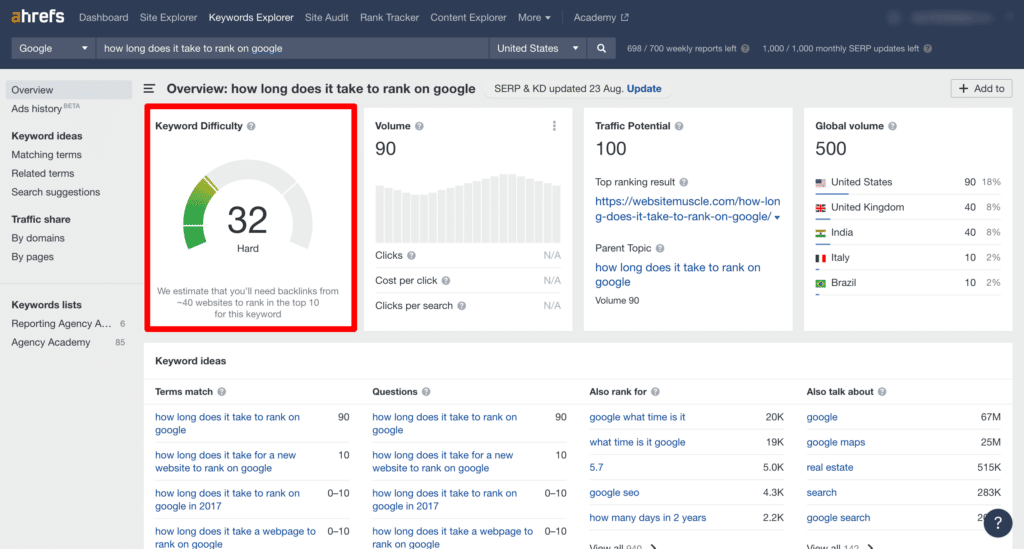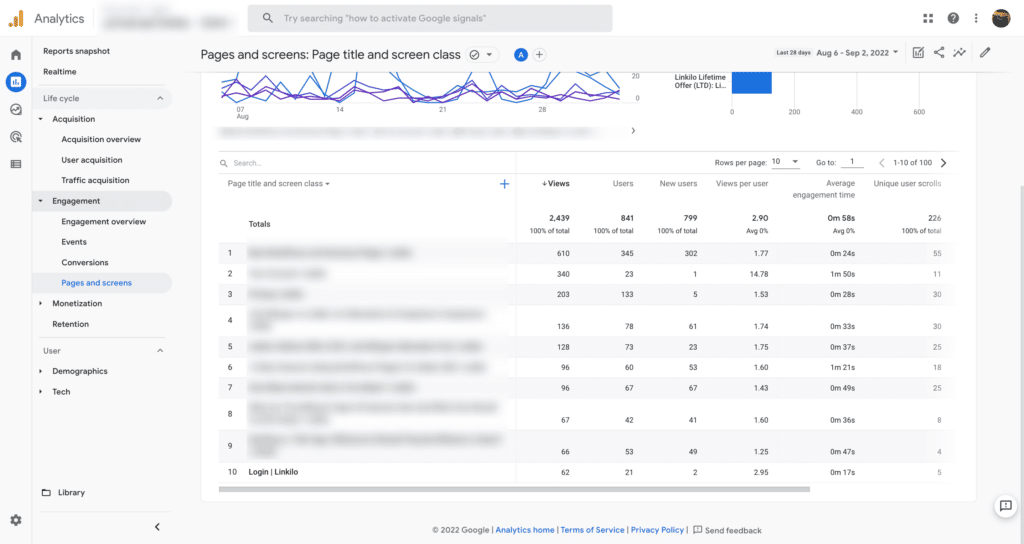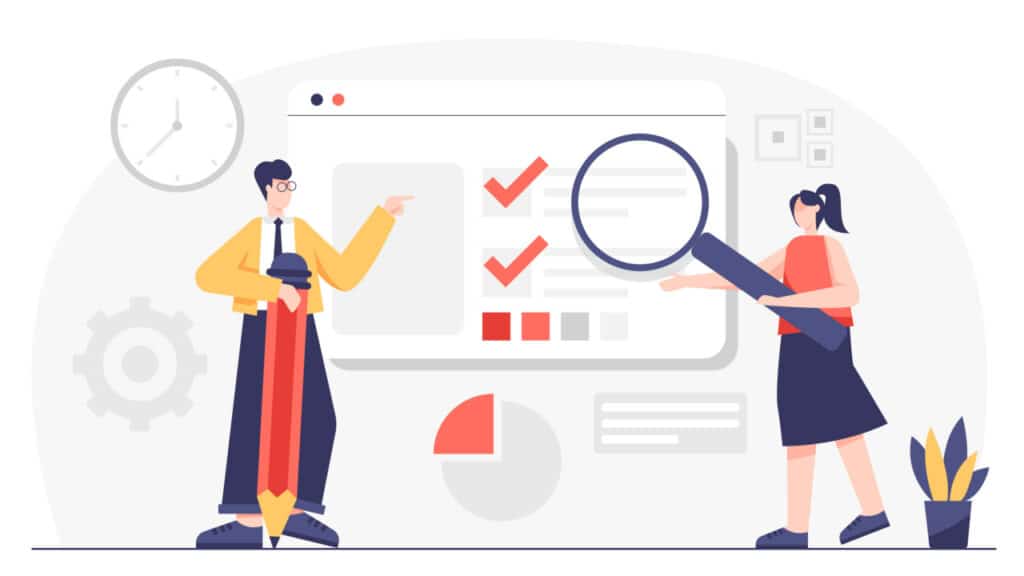Whether you’re just getting started with SEO or have been providing SEO services for a while, everyone always seems to ask you the same question:
Table of Contents
How long does it take to appear in Google results?
There isn’t a secret technique for ranking a website on Google, and no one can predict how long it will take to appear on the first few pages.
According to many studies, it could take 3-4 months for Google to begin sending visitors to a newly launched website. If you are going in the proper direction and waiting for about six to seven months, you should start seeing significant Google traffic.
To clear up any misunderstanding, the previous estimates are to places on Google that may be able to bring you some organic traffic, not necessarily one of the top 5.
You might have to wait longer than a year to rank better on Google and take the top rankings.
How long does it take to get found on Google?

The following are the most crucial elements that are also related to how long it takes to rank in Google, according to statements made by Google on numerous occasions.
Age of the domain
If all other circumstances are equal, a reputable, older website will typically appear higher in Google search results than a fresher one. This indicates that it will take more time and does not imply that a new website cannot attain high ranks.
When a domain has been live for less than six months, it is considered new. After the initial 6 months, you can begin receiving significant search engine traffic.
Clean domain
A website with a clean domain has not received a human or algorithmic penalty from Google. What indicators exist for a clean domain? Two options exist for doing this:
- Upon logging into Google Webmaster Tools, choose “Manual Actions” from the Search Traffic menu by clicking on a website to access the dashboard. The website has no manual penalties if you notice “No manual webspam actions discovered.”
- You should look for algorithmic sanctions in addition to manual penalties. The best approach is to get the traffic sources to report in Google Analytics (or in the analytics program you are using).
Choose Google as the traffic source and start the date range at the year’s commencement. Keep an eye out for any significant changes in traffic and contrast the dates of these changes with the history of Google algorithm updates.
If there is a correlation between the dates you experienced a drop in traffic and the dates Google implemented adjustments, your website has likely been penalized. Depending on the modification, you can begin working on its recovery.
It is a waste of time to attempt to rank for any terms in Google if your domain is not clean since the enforced penalty will prevent you from doing so. The best way to proceed is to clean your domain first, or you can think about starting over with a new domain.
Keyword competition

You should be picky about the keywords you want to rank for because there is fierce competition, especially for the most popular ones. Without a highly solid and reliable website, it’s unlikely that you will achieve much if you try to target popular keywords in the hope of increasing traffic.
Instead, concentrate on low-competition keywords until you achieve good ranks for them, and only then should you attempt to compete for popular keywords.
Analyzing your existing content with the help of an SEO agency
Ascertain whether the content on your present website is SEO-optimized by working with an SEO company (or hire a very seasoned SEO manager for the job). Ensuring every page on your website has all the components that Google looks for is the aim.
Assess page performance
One of the most important SEO ranking variables is page speed. Google’s Mobile First index uses it as its primary ranking factor.
Google will not rank your website if it loads slowly, which makes sense given that the average internet user expects your page to load in 3 seconds or less. Page speed is crucial for your site’s usability (UX), conversion rates, and general user satisfaction, in addition to increasing your chances of ranking better on Google.
Use HTTP2 protocol, enable Google AMP (which was created to assist mobile pages load faster), and switch to PHP7 (if you’re using WordPress) to speed up your [mobile] website and pages.
Use CDN to ensure your page content is being provided from the location nearest to the user, and do page speed tests to check how your site compares to the competition. Of course, you should avoid using too many scripts, fonts, or plugins, as this could make your page load more slowly.
Number of posts/quantity of content on the website
A post published on a website with many high-quality existing posts will likely rank more quickly than a post published on a website with few existing articles. It should go without saying, but occasionally it’s vital to clarify the fundamentals. Expecting non-original content to rank on Google or other search engines is unrealistic.
Content length
The duration of the content is a proximate ranking element. A longer article on the same subject that goes into more detail has a better chance of ranking higher, but it can also take longer for search engines to understand.
In reality, the longer the content does not mean, better or faster ranking. A 300 word article that provides a very concise answer to someones question can rank faster than a 3000 fluffed content.
This increases the likelihood that it will catch the eye of other bloggers and gain backlinks or mentions (shares and likes) on social media. The time it takes to be discovered by the Google algorithm is shortened by the buzz it generates.
The variables that come into play
Most marketers are generally aware that more than 200 ranking elements are at play, but the most significant ones that directly affect a website’s ranking are detailed here. These elements significantly impact a website’s ranking and determine which sites ascend to the top first and hold that position for the longest.
User metrics

In many cases, I’ve seen sites rank within a few months if they have high brand queries and incredible user metrics. However, you will typically have to wait more than a year if you don’t have that.
When I speak of a certain domain, I’m referring to the entire domain. Said user analytics determine whether visitors to your site enjoy it. Here are a few fundamental user metrics that search engines take into account.
While search engines do not use Google Analytics to determine if your site is worth ranking, it does help YOU understand if the content you are producing is quality, based on your user experience.
1. Total traffic
The total number of visitors to your website is the total traffic measure. Any route, including organic, social, direct, or referral, may be the source. Compared to a website that receives 2,000 monthly visitors, a site that receives 25,000 monthly visitors is deemed more valuable by search engines.
2. Page views
A webpage visit on a website is counted as a page view. Page A and Page B will each receive one page view if a visitor arrives on Page A of your website before leaving to visit Page B. Page A will now have two page views if the user exits Page B and returns to it.
The prominence of a webpage is shown by its high page view count. It indicates that users frequently return to the website for relevant information. A page should have many page views to rank better on Google.
3. Average engagement time on page/site
This number represents the time a visitor spends on your website or webpage. A page that receives a lot of time from users ranks faster since there is more positive user involvement, while a page that receives less time from users ranks more slowly.
4. Scroll depth
This indicator calculates how far users have scrolled down the page. The search engines consider that when the scroll depth is large, users are truly interested in reading more content.
5. Unique visitors
This counts the variety of IP addresses people access your website. It determines how many various people have visited your website. A website with a higher proportion of unique visitors is more popular and deserving of a higher rating.
Therefore, if you can rapidly boost the number of unique visitors is more popular and deserving of a higher rating. Therefore, if you can rapidly boost the number of unique visitors to your site, Google might promote it by placing it first in the SERPs.
How to speed up your Google rankings
Now that you know that it takes some time (at least 6 to 12 months) to rank your website on Google because rankings depend on a variety of factors let’s look at the variables that can hasten your Google rankings and improve user experience, make navigation simple, and speed up your website’s loading time.
- Choose the pages you already rank for but don’t rank well, then optimize them for pertinent keywords and phrases.
- Create information that is original, reliable, and helpful to the user. Use external links to support any figures or statements you make in your material.
- Make your website mobile-friendly.
- Get as many backlinks from reputable sites as you can.
- Fix broken links and use internal links that lead to similar information.
- Every time you add a new page to your website, send a sitemap to Google Search Console.
- Remove obstacles and other distractions from your homepage that prevent visitors from completing the primary goal they came for.
- Use Google advertisements to your advantage to boost click-through rates.
Conclusion
Obtaining high ranks on Google takes time. If you’re launching a website, it can take 3-4 months before Google starts sending visitors.
If you are going in the right direction, you should start seeing more significant traffic from Google and other search engines after about six to seven months.





